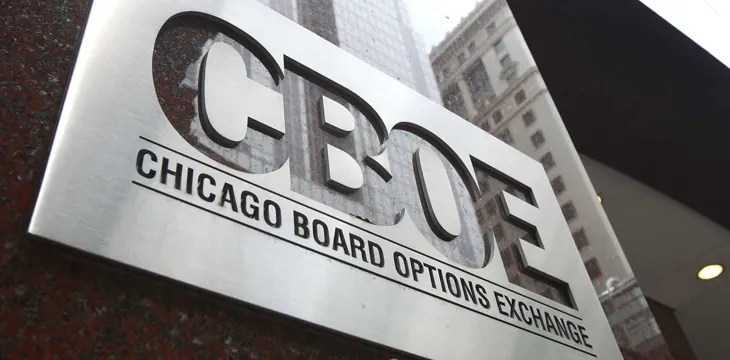|
Getting your Trinity Audio player ready...
|
Futures exchange CBOE has filed a SegWit BTC-only exchange-traded fund (ETF) with the U.S. Securities and Exchange Commission (SEC), becoming the latest company to attempt to gain regulatory approval for this type of investment vehicle.
CBOE, considered to be the world’s largest futures exchange by volume, said the ETF would allow investors to speculate on BTC, without engaging directly in the market, in what could pave the way for greater mainstream interaction with cryptocurrency markets.
According to the filing, the proposal would allow accredited investors to access BTC via over-the-counter (OTC) transactions, while providing insurance cover for funds acquired by its investors.
According to CBOE’s registration statement, “the Trust will invest in [BTC] only. The activities of the Trust are limited to: issuing Baskets in exchange for the cash and/or [BTC] deposited with the Cash Custodian or Trust, respectively, as consideration; purchasing [BTC] from various exchanges and in OTC transactions; delivering cash and/or [BTC] in exchange for Baskets surrendered for redemption; maintaining insurance coverage for the [BTC] held by the Trust; and securing the [BTC] held by the Trust.”
CBOE is one of three exchanges to have pending applications with the SEC. Several ETFs previously proposed for regulatory approval were denied by the SEC back in 2017, including the high-profile Winklevoss ETF, with the SEC flagging the potential for market manipulation as one of the key reasons in denying its listing.
However, with new regulatory frameworks in countries like Japan and South Korea, it is possible the SEC will recognize the fundamental shift in underlying market conditions.
Additionally, the SEC’s previous rejections flagged a lack of insurance for investors as another key reason for their decisions. As a result, the filing specifically addresses this concern, and proposes additional investor protections against loss, theft, destruction and fraud.
“In addition to its security system, the Trust will maintain comprehensive insurance coverage underwritten by various insurance carriers. The purpose of the insurance is to protect investors against loss or theft of the Trust’s [BTC]. The insurance will cover loss of [BTC] by, among other things, theft, destruction, [BTC] in transit, computer fraud and other loss of the private keys that are necessary to access the [BTC] held by the Trust,” according to the statement.

 07-04-2025
07-04-2025 





